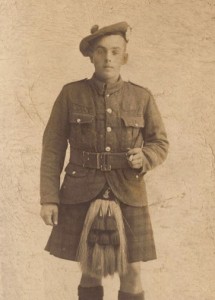Thomas McIntosh The cost of war - continued
Thomas McIntosh was born on the 29th November 1899, the fifth and second youngest son of Joseph McIntosh and Isabella Scott. Like his older brother, George, he was born at Fingast in the parish of Kilspindie and, after moving to Easter Bonhard, was also educated at Kinnaird Public School. After leaving school in 1913, he worked on the land and, after George enlisted in 1915, Thomas who had just turned sixteen became the sole breadwinner for his mother and three younger siblings.
Scone was a small community in the early 1900s and I imagine Thomas and his brother, George, would have known many of the lads killed, wounded or missing on the Western Front – they would have been former classmates or lads with whom they would have socialised at the weekend. News of casualties would have spread quickly by word of mouth and each week the local newspapers gave them wide coverage. Looking at the number of death notices and the lists of wounded and missing must have been deeply depressing.
Conscription had been introduced at the beginning of 1916 with the minimum age reduced to eighteen and Thomas would have known that, with no prospect of the war ending, his time would come. When the news of his brother’s death came through in October 1917, Thomas’ eighteenth birthday was only a few short weeks away. By that date, the military machine was desperate for manpower – the height requirement had been reduced from 5ft 3 ins to 5ft 0 ins, malnourished youths who would have been rejected in 1914 were passed as fit and infantry basic training was reduced from twelve to six weeks.
Although Thomas’ eighteenth birthday was in the November of 1917, it is a bit of a mystery why he didn’t get conscripted till May 1918. By that time, many people were appealing against being conscripted on grounds such as working in an occupation necessary to the war effort or that they were the sole support for a family or even that they were conscientious objectors. Thomas was certainly the sole means of support for his widowed mother and three siblings and perhaps this would have got him a temporary deferment. However, following the German offensive of March 1918 that came within a hairsbreadth of ending the war, every available man or boy who could hold a rifle was needed in France.
By April 1918, things were so bad that Sir Douglas Haig’s Order of the day on the 11th of that month read:
Victory will belong to the side that holds out the longest. There is no other course open but to fight it out.Every position must be held to the last man. There must be no retirement. With our backs to the wall and believing in the justice of our cause each one of us must fight on to the end.
It must have been traumatic for my Mum’s granny when her youngest son was conscripted into the Argyll & Sutherland Highlanders only a few months after George’s death. After a few short weeks of training, Thomas would have been packed off to France, arriving around the beginning of July to join the 2nd Battalion of his regiment. Thomas had his photo taken before leaving for France and, beneath the big Glengarry he’s wearing, there was just a wee boy.
Eighteen year old Thomas McIntosh is buried at the small Selridge Cemetery at Montay in north east France and only a comparatively short distance from where his brother lies. How his mother must have felt as she watched the telegram boy coming up the path towards her house does not bear thinking about.
A Roll of Honour was compiled shortly after the end of the war as a memorial to the men of the parish of Scone who had been killed in the conflict – a total of some 71 men from this community of around 2500 souls. What evokes an even greater sense of sadness is that this figure contains no less than ten sets of brothers, one of which is George and Thomas McIntosh.
Robert Laird, Kirkcaldy May 2014

